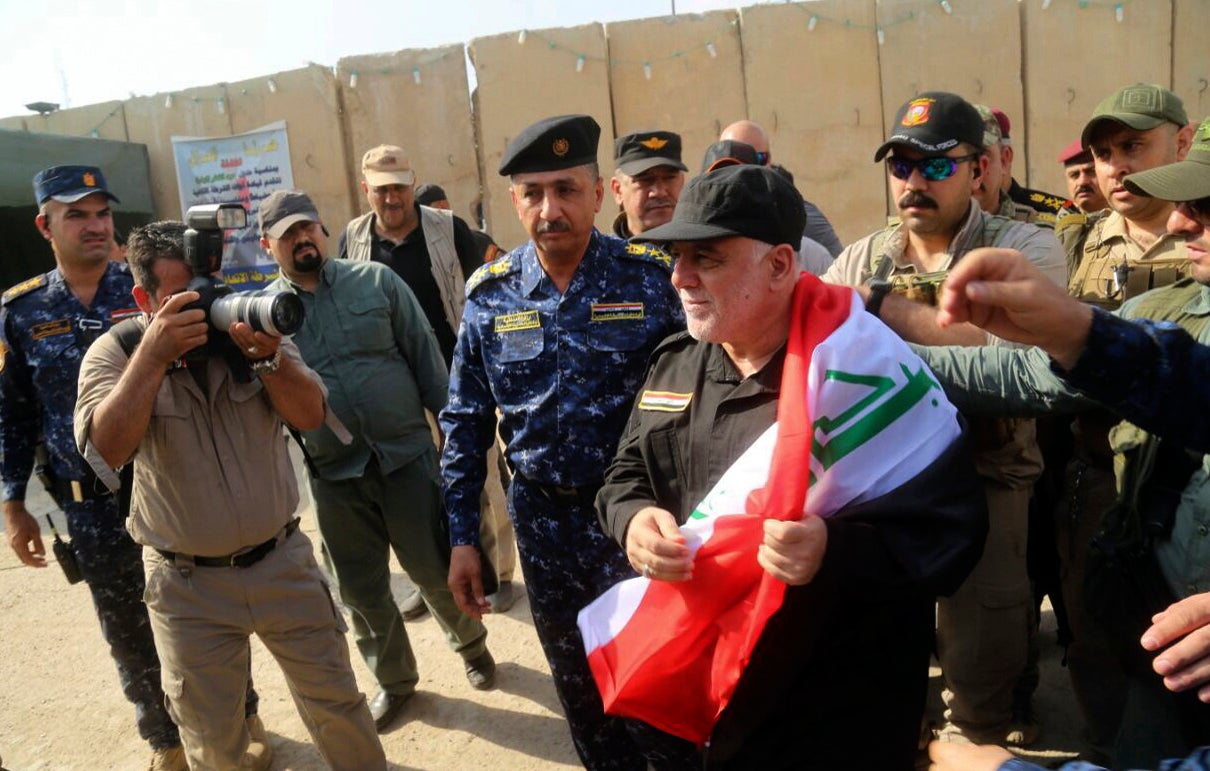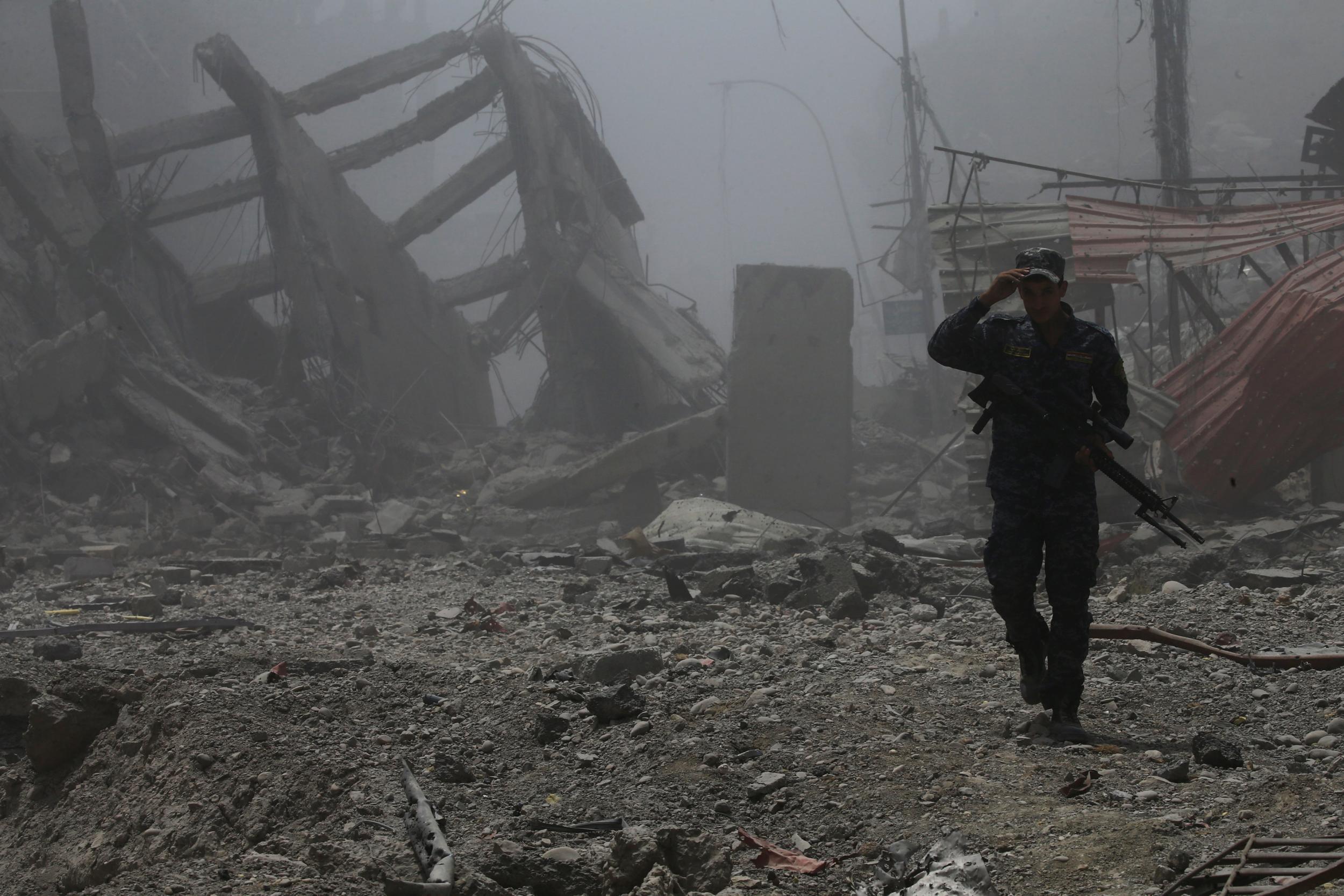Mosul victory marks 'collapse' of Isis, says Iraqi Prime Minister
The US says that the reconstruction of essential facilities in Mosul will cost at least $1 billion

Your support helps us to tell the story
From reproductive rights to climate change to Big Tech, The Independent is on the ground when the story is developing. Whether it's investigating the financials of Elon Musk's pro-Trump PAC or producing our latest documentary, 'The A Word', which shines a light on the American women fighting for reproductive rights, we know how important it is to parse out the facts from the messaging.
At such a critical moment in US history, we need reporters on the ground. Your donation allows us to keep sending journalists to speak to both sides of the story.
The Independent is trusted by Americans across the entire political spectrum. And unlike many other quality news outlets, we choose not to lock Americans out of our reporting and analysis with paywalls. We believe quality journalism should be available to everyone, paid for by those who can afford it.
Your support makes all the difference.Iraq's Prime Minister formally declared victory over Isis in the northern city of Mosul, saying their defeat marks the "collapse" of the self-proclaimed caliphate.
"I announce from here the end and the failure and the collapse of the terrorist state of falsehood and terrorism which the terrorist Daesh announced from Mosul," Haider al-abadi said in a speech shown on state television, using an Arabic acronym for Isis.
His Iraqi government is greatly strengthened by its defeat of Isis which three years ago launched the Caliphate in the wake of its unexpected capture of Mosul, the second largest city in Iraq. Iraqi security services could not have succeeded militarily without being able call in air strikes at will to destroy any Isis defensive positions. This has led to very heavy civilian casualties and immense destruction. .
Mr Abadi has hitherto refused to work on a political plan for Mosul after the defeat of Isis, probably calculating that his leverage would be much greater after victory than before and that of the Kurds will be much less.
For several years after the US invasion of 2003, the Kurds were central players in controlling Mosul where there was a substantial Kurdish minority. They also took advantage of the Isis advance in June 2014 and the collapse of Baghdad government forces to seize territories long disputed between them and the Arabs.

The offensive to recapture Mosul could only be launched in October last year after there was an agreement on what would happen between the Iraqi and Kurdish leaders, orchestrated by the US.
This probably caught Isis by surprise because relations between Baghdad and Erbil had been very cool. The US was then expecting the battle to take the city would last two months rather than the nine months it has in fact taken.
The Iraqi government, which is essentially Shia, must now decide how it will cope with the largest Sunni Arab city in Iraq which it has always seen as an obstacle to its rule. The fall of Mosul is not just a defeat for Isis but for the Sunni Arabs, who were the dominant community in Iraq before the fall of Saddam Hussein in 2003, although they were only a fifth of the population.
A large part of the officer corps of the Iraqi army came from Mosul and the Iraqi defence minister came from the city.
The US says that the reconstruction of essential facilities in Mosul will cost at least $1bn (£780m) and there is no provision for this in the Iraqi budget, which is already under strain because of low oil prices.
Much of the oil revenue is spent on paying salaries and pensions for seven million public employees and or paying for the war. Shia political leaders in Baghdad are unlikely to give priority to rebuilding a city they have always seen as being the heart of Sunni resistance.
Overall, the fall and devastation of Mosul is only the latest and most calamitous event for the Sunni Arabs of Iraq. Their other main cities such as Ramadi, Fallujah, Tikrit and Baiji have all been badly damaged by war.
At least 900,000 people from Mosul city are in camps, but those from the Nineveh Plain east of the city find that they are not being allowed back to their home villages, many of which are being bulldozed. The battle for Mosul has opened the door to ethnic and sectarian cleansing and counter-cleansing, as the winners in the war seek to create a new political landscape.
Join our commenting forum
Join thought-provoking conversations, follow other Independent readers and see their replies
Comments